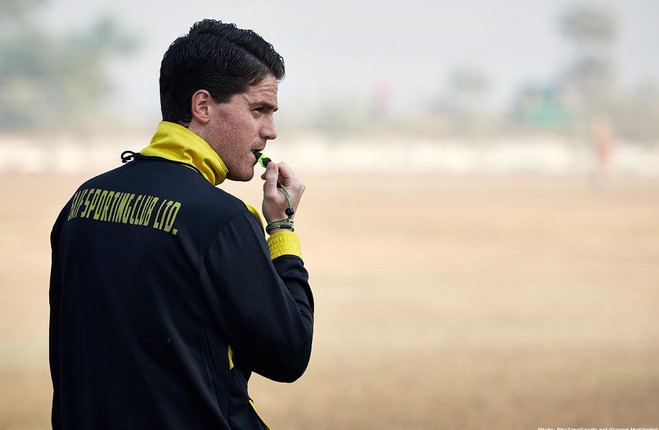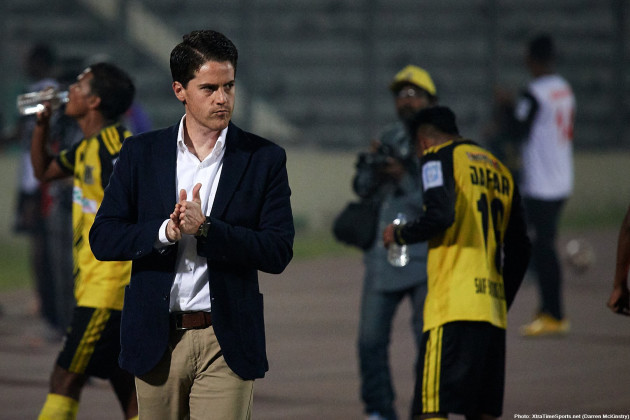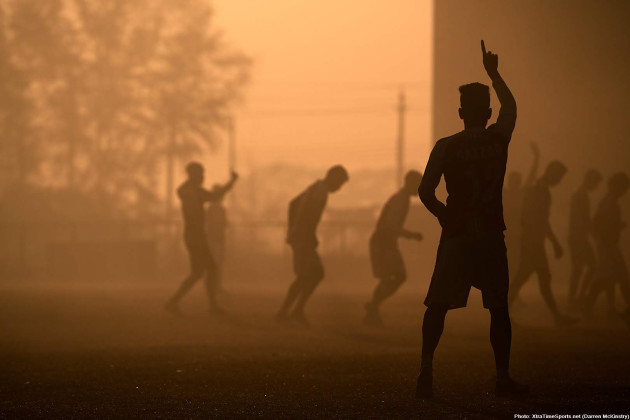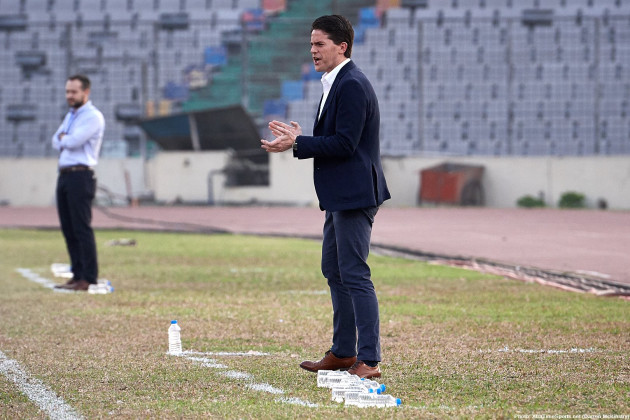THE YEAR BEGAN with Johnny McKinstry in Lithuania and preparing for a new club season.
It will end with him in Dhaka, the capital city of Bangladesh.
It’s a new challenge and another far-flung destination and he’s just glad to be inching closer to a new campaign given what happened this time twelve months ago.
He was only a week away from starting pre-season with Kauno Zalgiris but he couldn’t shake some apprehension.
There was still no clarification from the league’s top brass regarding restructuring plans for the 2019 campaign. There had been verbal confirmation that the team would remain in the top flight but nothing legally-binding. As a result, McKinstry’s employers were reluctant to commit to anything until it was all sorted. But that meant he had no idea of budget or resources and with only a minimum amount of players signed, McKinstry was already playing catch up.
Still, the previous few weeks had been encouraging. Using his contacts in Africa where he’d served as manager for both the Sierra Leone and Rwanda national teams, a scouting trip to Nigeria proved fruitful. There were some players from Scandinavia teed up to join as well. McKinstry felt that even with a tight budget, the new acquisitions could make an impact and help deliver Europa League qualification.
But, time drifted on and he needed assurances. None were forthcoming. Ultimately, there was an amicable parting of ways.
“Had I decided to stay, I think it would’ve been a big challenge that probably wouldn’t have worked out too well,” he says.
“Sometimes it’s better to accept what can’t be and move on. It was just one of those things. A few different elements collided which meant it wasn’t really workable to stay on, which was disappointing but that’s the way life is sometimes. Clarity is always better than vagueness. It was frustrating more than anything.”
McKinstry wasn’t waiting around for long and there was immediate interest from a handful of international teams keen on his services.
“You’re eager to get going again,” he says.
After some of the previous jobs – Sierra Leone and Rwanda to a degree, it was a case of, ‘Right, let’s take a month or two’. But after Lithuania I was ready for preseason to start so you’re waiting for the next one. It was agonisingly close in terms of three jobs. But, sometimes you just don’t click. For instance, I was in Iceland speaking to a club in the top division about their head coaching role. You go in and present yourself and maybe some other people might tell the employer what they want to hear but I’m not like that. You try and figure out if it’s a round peg for a round hole but sometimes it’s not. It’s better to go in, be honest and upfront and if they’re on the same page then you’ve got half a chance of being successful because everyone knows the direction you’re going in.”
Hanging on the telephone. The realities of football management.
McKinstry knows all about them and has bounced between jobs over the last few years. He took charge of Sierra Leone at just 27 years of age and his time there put him in the shop window. Next was Rwanda, which proved disappointing. Despite being rewarded with a new two-year contract in 2016, he was sacked just a few months later. With the stint in Lithuania conjuring a less-than satisfactory conclusion too, you’d forgive McKinstry for a sense of bitterness or upset. But, even when an offer came to change course a little, he stuck to his guns.
“I’ve always said that I’d be open to work with another coach or manager if the right opportunity came up,” he says.
“Interestingly enough, I was asked if I’d be interested in going into the English Football League (EFL) as an assistant coach to somebody I know. I thought about it. I had the discussion. But an offer to come to Asia was also on the table. It wasn’t the easiest decision in the world but I felt the club here were ambitious enough. It made going into the dogfight of possibly fighting against relegation in the EFL that bit harder. I looked at it and felt I might only be there for four or six months and I thought this was a better opportunity. You want to make that step back to England but it has to be the right step. And I didn’t think it was the right one at this time.”
In any league, but especially in England right now, there are a lot of bad opportunities. People are in a hurry to get into positions but I know enough from my work with the League Managers Association that some guys have gone in and three or four months later are out of a job. And you chat to them afterwards and they say they wish they hadn’t taken it and that they were in such a hurry to get the job that they didn’t care what it was. That can be quite damaging to a career, I think. So many guys are good coaches and good leaders but they take the wrong opportunity and after the first one they might never get a second.”
McKinstry had been to Asia before on a reconnaissance trip and was impressed. It was a region he could see himself working in, if the circumstances were right. So, when he was contacted by Saif Sporting Club of the Bangladesh Premier League, he was intrigued. He’d been recommended to them by their former manager, Stewart Hall, and after some initial conversations, he found himself on a plane.
“From the first phone call to getting on a flight was about four or five days so it all happened quite quickly,” he says.
“But despite being a hundred miles an hour, they were very organised from the first minute. You never felt things were being glossed over or being missed. The club is only three years old but very ambitious and owned by one of the country’s biggest companies. In their second year they finished fourth and qualified for the AFC Cup, which is the Asian equivalent of the Europa League. So, the objective is to reach continental competition again and see if we can improve on last season. Obviously, the league winners reach the Asian Champions League so there’s that to aim for also.”
We’re based in Dhaka and last season, from the 13 top flight clubs, eight or nine of them played out of the national stadium here. But Dhaka is the world’s most densely populated city so getting anywhere is very difficult. To give you an example, we’re doing a little training camp right now so we’re about three hours outside of Dhaka. But that’s when there’s no traffic. So, I left the house this morning at 5.30am, to make sure there was no traffic. If I left at 8am, it would have taken me seven hours. Traffic here genuinely stands still. As a result, crowds for games are smaller here. You’ll have anywhere between 1,000 and 5,000 coming in. But in the provinces, because it’s easier to get to games and probably less recreational activities for people, you’ll get about 15,000 – 20,000. So, what the league has done, is allow three teams register at the national stadium for the coming season and the other ten will use the regional stadiums. So when we kick off in January, we’ll be three hours outside the city and the minimum we’re expecting for games is in excess of 10,000.”
McKinstry, a Lisburn native, started out coaching underage with Distillery when he was just 16. Ever since, he’s been around the world. After studying at the University of Northumbria, he spent some time as a Player Development Officer with Newcastle United. Then he was hired by Major League Soccer side New York Red Bulls as a Pre-Academy Coach. There was a stint at a football academy in Ghana before he arrived in Sierra Leone and oversaw Craig Bellamy’s Foundation Academy. His work there led to the national team job and he’s never looked back.
He’s well used to new places and new cultures and Dhaka certainly doesn’t intimidate him. Bangladesh has its own quirks and idiosyncrasies but McKinstry is keen to immerse himself. He feels that as much as it’s a personal trait, it also benefits the relationship between an ‘outsider’ manager and the club.
“The one thing that surprised me here – and this is just my experience – is that the international community keep themselves a bit separate from the locals,” he says.
“Now, maybe that’s because they’re a little older here. In Africa, because of the gap year culture and volunteering, it tends to be a bit younger. And they might interact more readily with local communities. But myself and Alex, my assistant, are doing what we always do and just integrating ourselves. We go to a restaurant here all the time and we’re the only non-Bangladeshi people eating there and our staff think it’s amazing. But, as a result, what we get back from within the club is very positive and maybe they buy into what we’re trying to do a bit more because we’re wanting to be a part of the community.”
Also, when I go back to England, I don’t think I’ll ever order a curry again because the food here is incredible.”
The country loves football but, as one of the world’s top-ten teams, Bangladesh is cricket-obsessed. However, they do that a little differently too.
“I don’t mind it but I’m not sure what 50 overs of it would be like when you’re not able to enjoy a beer in the sun,” McKinstry says.
“Bangladesh is a Muslim country so there’s no alcohol. Not that that’s an important thing but culturally in the UK, you can have a glass of wine or a few beers while you’re watching it. Over here, everyone’s there purely for the sport so it’s a bit of a different environment.”
After a short break, the players all return to training on New Year’s Day and the new season then gets underway in mid-January. So, that’s meant McKinstry having to spend the festive period thousands of miles from home.
“A trip to the UK or Ireland is about 16 or 17 hours so only having four or five days off, you’re basically going to use three of them for travel,” he says.
But, he doesn’t mind too much. It leaves more time for McKinstry to plan and strategise and look ahead.
Hungry to get started again.
Subscribe to our new podcast, Heineken Rugby Weekly on The42, here:




